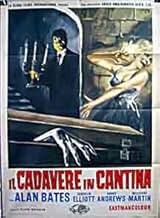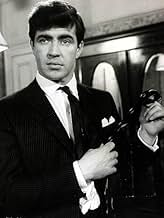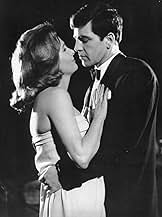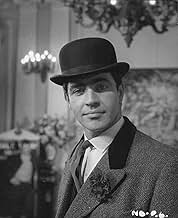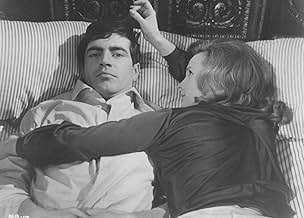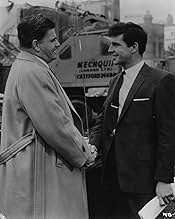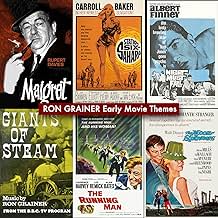VALUTAZIONE IMDb
6,5/10
564
LA TUA VALUTAZIONE
Aggiungi una trama nella tua linguaA young and ambitious businessman hires an unemployed upper-class man to tutor him in the life skills which he thinks are necessary to succeed. When he succeeds, disaster threatens.A young and ambitious businessman hires an unemployed upper-class man to tutor him in the life skills which he thinks are necessary to succeed. When he succeeds, disaster threatens.A young and ambitious businessman hires an unemployed upper-class man to tutor him in the life skills which he thinks are necessary to succeed. When he succeeds, disaster threatens.
- Regia
- Sceneggiatura
- Star
- Nominato ai 1 BAFTA Award
- 1 vittoria e 3 candidature totali
Avice Landone
- Mrs. Horton
- (as Avice Landon)
Anneke Wills
- Girl
- (as Annika Wills)
Recensioni in evidenza
Alan Bates is the scoundrel here who thinks he is about to get away with anything. Everything is wrong with him except his ambitions. In order to climb the social ladder to riches and success he not just uses any dirty tricks to get along on the way, but his knack is simply to follow the mainstream of general hypocrisy, consistent deceit by means of sticking to lies, outrageous audacity and the general euphemistic way of life ignoring all that is out of any private interest to you. Everything here is permanent dishonesty, and for its blatant shamelessness the film is actually shocking in its horrible satire of upper class business life, while you must admit that it is extremely well done, in perfect cleverness, wit and elegance. All the actors are perfect, and you don't even feel sorry for Denholm Elliott who actually did nothing to help himself except in digging his own grave, while Alan Bates' acting is a marvel of sticking to a masked role. Millicent Martin actually suits him, it is even suggested that she sees him through and appreciates his charade, and you are used to Denholm Elliott as the perfect loser. In brief, in spite of its revolting immorality, the film is thoroughly enjoyable for its virtuosity in cleverness and elegance.
Its a wonder this movie has been recently shown on the TV in the UK, a certain movie called Saltburn is currently having a moment which bears many similarities.
This is a British 1960's romp in which an ambitious man happens upon an upper class waster who has been shunned social and lost his job as a result of being caught committing fraud. The lead sees this as an opportunity to climb the social ladder from his lower middle class rung onto the one occupied by the upper classes. He does this by offering the waster a proposition, free board in exchange for being taught the social ropes of the upper class. He agrees and that's where things get interesting.
In order not to spoil the plot, this does get very dark two thirds of the way through. Its tone is that of a dark comedy/satire and as a result its actually quite difficult to second guess where the narrative will go. As a result its a highly entertaining watch. Of course its dated in terms of music but not so much in terms of the upper classes who haven't budged an inch into modernity lest it alter their identity.
This would be a great companion piece to Saltburn as it is a very similar story but without the obvious meme generating scenes shoehorned into Saltburn which didn't add to the story, but were simply there in order to hijack social media and generate interest into what is at best an average movie. This one however manages to keep you engaged because its simply a well told story. Even if it is quite a bitter one.
This is a British 1960's romp in which an ambitious man happens upon an upper class waster who has been shunned social and lost his job as a result of being caught committing fraud. The lead sees this as an opportunity to climb the social ladder from his lower middle class rung onto the one occupied by the upper classes. He does this by offering the waster a proposition, free board in exchange for being taught the social ropes of the upper class. He agrees and that's where things get interesting.
In order not to spoil the plot, this does get very dark two thirds of the way through. Its tone is that of a dark comedy/satire and as a result its actually quite difficult to second guess where the narrative will go. As a result its a highly entertaining watch. Of course its dated in terms of music but not so much in terms of the upper classes who haven't budged an inch into modernity lest it alter their identity.
This would be a great companion piece to Saltburn as it is a very similar story but without the obvious meme generating scenes shoehorned into Saltburn which didn't add to the story, but were simply there in order to hijack social media and generate interest into what is at best an average movie. This one however manages to keep you engaged because its simply a well told story. Even if it is quite a bitter one.
What a superb film in my opinion difficult to beat. The British system slyly used to the main characters advantage . Alan Bates and Denholm Elliot excel in this classy tongue in cheek rendition of how to succeed. A film worthy of release particularly since the demise of both main stars.
A film from the "Swinging London" era and, like much of the output pertaining to that camp, one that feels quite dated when viewed today. It nevertheless maintains a sense of style throughout (Nicolas Roeg was the cinematographer) and the familiar plot (following the exploits of a social climber in the none-too-exciting world of high-finance – suffice to say that it is sometimes hard to discern the exact function of the various minor characters the protagonist comes into contact with!) still works thanks to the blackly comic vein in Frederic Raphael's script and Alan Bates' central performance as the cocky anti-hero. Even so, the supporting cast is just as notable – highlighting in particular Denholm Elliott (as Bates' 'tutor' in the money-making ways and whom he later callously disposes of), Millicent Martin (as the high-society girl he sets his sights on: she also sings the title number!), Harry Andrews (as the latter's father and Bates' boss), Pauline Delany (as Bates' ageing landlady and occasional fling) and James Villiers (as, typically, an upper-class twit and Martin's intended). The inherent amorality at work anticipates ALFIE (1966) in many ways (incidentally, Martin turned up here as well): though a box-office smash and a multi-Oscar nominee, I had actually found that film to be similarly overrated. The twist involving Elliott's true identity – which threatens to expose Bates for what he is, but which he still manages to turn in his favor (since the script clearly wants us to root for him) – does end proceedings on a high note in this case. For the record, this seems to be another ultra-rare title, having acquired it via a less-than-optimal copy culled from an old TV broadcast
I saw this film in 1964 when it was first released; and it is still the only film that I have sat through for two consecutive showings. I thought it was brilliant, sharp and very funny. Alan Bates, then a major international star, was at his very best: funny, cynical, cold, vicious, everything the role required. The supporting cast - led by Millicent Martin, Harry Andrews, Denholm Elliott - were also superb.
Jimmy Brewster (Bates) is, to use the derogatory upper-class term, "an ambitious yob", a working-class chap toiling anonymously at his desk in a large real-estate company and wanting better things, when one day he has an accidental encounter in a restaurant with Charlie Prince (Elliott), the disgraced son of Brewster's employer. As Charlie puts it, "One day a black cloud appeared in my office, and shortly after that I departed under it." Charlie is a worthless wastrel, but he has one skill: he can show Jimmy how to dress and talk properly and to be a "gentleman". The trade-off is that Jimmy will give Charlie a place to live and money for expenses. Charlie is a good teacher and Jimmy is a brilliant student, conning everyone in sight, slowly climbing the ladder to success. Then one day, Charlie asks Jimmy to lay a large bet for him - with Jimmy's money - on a horse, and the horse wins, at astronomical odds. Charlie is very much in the money again, and decides he doesn't need Jimmy any longer. But Jimmy turns the tables, does away with Charlie, and keeps the money for himself. And continues his climb up the corporate and social ladders, all the way to the top. Along the way he woos Charlie's sister, Ann (Millicent Martin), and marries her. In a memorable scene, while courting Ann, Jimmy takes her to massive country estate that is conveniently empty, pretending that it belongs to his family. Ann looks at the magnificent place, suitably impressed, smiles at Jimmy and delivers one of the best lines in the film: "Darling, how did you know my size?"
And then Charlie's body is found, and perhaps the ruthless, if charming, Jimmy is about to come a-cropper. Or perhaps not.
It's a brilliant film on all levels. The great tragedy is that it appears to be no longer available, on film or on video/DVD. If I could find the magic lamp, and be granted one filmic wish, "Nothing But The Best" would be in general distribution on DVD next week.
Jimmy Brewster (Bates) is, to use the derogatory upper-class term, "an ambitious yob", a working-class chap toiling anonymously at his desk in a large real-estate company and wanting better things, when one day he has an accidental encounter in a restaurant with Charlie Prince (Elliott), the disgraced son of Brewster's employer. As Charlie puts it, "One day a black cloud appeared in my office, and shortly after that I departed under it." Charlie is a worthless wastrel, but he has one skill: he can show Jimmy how to dress and talk properly and to be a "gentleman". The trade-off is that Jimmy will give Charlie a place to live and money for expenses. Charlie is a good teacher and Jimmy is a brilliant student, conning everyone in sight, slowly climbing the ladder to success. Then one day, Charlie asks Jimmy to lay a large bet for him - with Jimmy's money - on a horse, and the horse wins, at astronomical odds. Charlie is very much in the money again, and decides he doesn't need Jimmy any longer. But Jimmy turns the tables, does away with Charlie, and keeps the money for himself. And continues his climb up the corporate and social ladders, all the way to the top. Along the way he woos Charlie's sister, Ann (Millicent Martin), and marries her. In a memorable scene, while courting Ann, Jimmy takes her to massive country estate that is conveniently empty, pretending that it belongs to his family. Ann looks at the magnificent place, suitably impressed, smiles at Jimmy and delivers one of the best lines in the film: "Darling, how did you know my size?"
And then Charlie's body is found, and perhaps the ruthless, if charming, Jimmy is about to come a-cropper. Or perhaps not.
It's a brilliant film on all levels. The great tragedy is that it appears to be no longer available, on film or on video/DVD. If I could find the magic lamp, and be granted one filmic wish, "Nothing But The Best" would be in general distribution on DVD next week.
Lo sapevi?
- QuizOn the commentary track for Saint Jack (1979), director Peter Bogdanovich said he became a huge fan of Denholm Elliott after watching this film, which was before he became a director. He cast Elliott in an important co-starring role in Rumori fuori scena (1992), which was his last film.
- Curiosità sui creditiClosing credits epilogue: ? THE END IS A PHRASE WHICH USUALLY CLOSES OTHER PEOPLES STORIES: IT NEVER APPLIES TO ONES OWN
- Colonne sonoreTitle Song
(Nothing But The Best)
Sung by Millicent Martin
To Music by Ron Grainer and Lyrics by Frederic Raphael
I più visti
Accedi per valutare e creare un elenco di titoli salvati per ottenere consigli personalizzati
- How long is Nothing But the Best?Powered by Alexa
Dettagli
- Tempo di esecuzione
- 1h 39min(99 min)
- Proporzioni
- 1.66 : 1
Contribuisci a questa pagina
Suggerisci una modifica o aggiungi i contenuti mancanti

